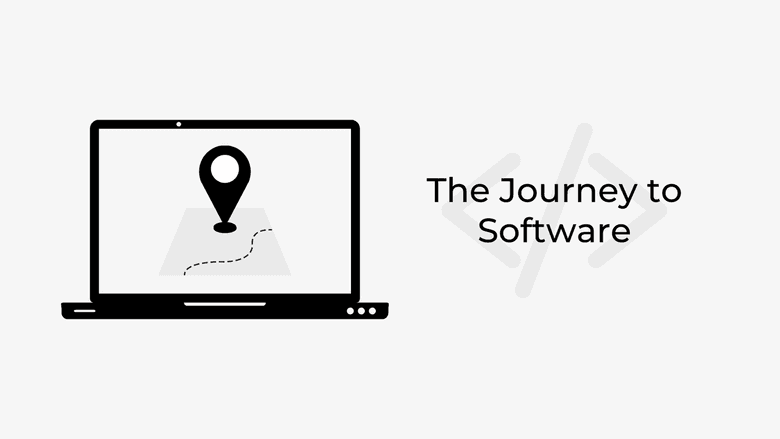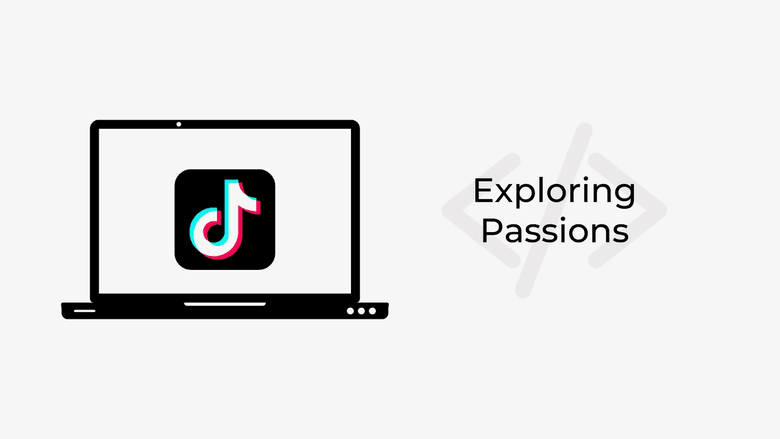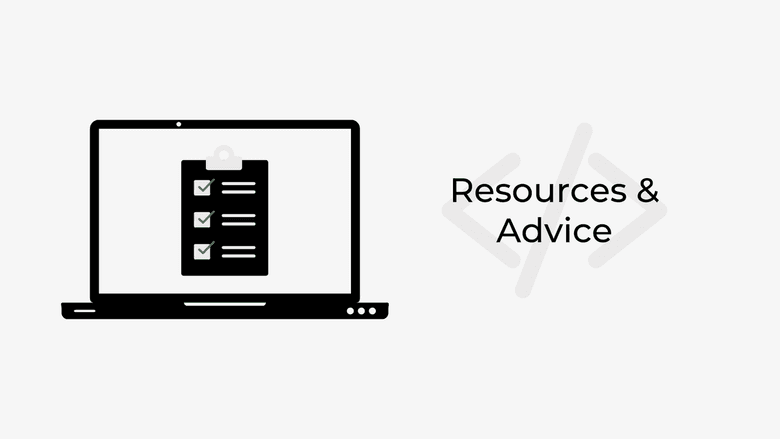Q&A with a Software TikToker
Software developer Matt Upham talks about his journey into software development and his experience pursuing social media
Matt Upham studied industrial engineering in college after taking one computer science class and deciding it wasn’t for him. Now, he works as a software engineer at a fintech company, runs a programming community on Discord, and has gained nearly 300,000 followers on TikTok, where he discusses software topics and encourages viewers to learn how to code. Upham talked to us about his alternative path into tech, tips for those on a similar journey, and his thoughts on diversity in the industry.

Can you tell me about your transition into software?
I thought I was going to go to college for civil engineering. I really like building stuff, and I did a project in high school where I built a garden shed for one of the local community service clubs. So I went into college, and the first few civil engineering classes weren’t really my favorite. So I was like, “Let me look into something else.” I actually did switch into computer science in the second semester of my first year, and the first class we took was pretty challenging. I think the first topic was recursion, which is known to be pretty all over the place. I passed the class but didn’t really do that well, so I was like, “Computer science is not for me at all.”
I switched to industrial engineering because I really liked working with people. Then I did four different internships. I did one at a water district, another one at a jet engine factory, a third one doing 3-D printing in China, and then a fourth one at a retail company-- all related to industrial engineering. And honestly, I did not like any of them. I think the nightmare one was the jet engine factory one. That was at, like, a pretty old-school dinosaur company, and the management was pretty bad. There was a lot of screaming on the shop floor, and nobody looked happy working there. And I think that kind of threw me into this whole spiral, like, “What am I going to do with my career?”
I graduated early and took a little time off that fourth year to figure out what I wanted to do? I looked at all these different avenues, and I thought, “You know what, I should probably go back to coding.” I ended up packing my car and heading out West with, like, no plan. I was just like, “I’m going to figure it out on the road.” I ended up landing in SF and met a web developer who kind of showed me what they did during the day, and I was like, “This is pretty cool. Maybe I can do this.”
At that point I went to Las Vegas and crashed at a friend’s place from college and ended up just sitting down and learned how to code. I spent about three months self-studying to see if I really liked it, and after that, I went to a coding boot camp in San Francisco. I think I started coding in September of 2017, and then I went to the boot camp in early December of 2017, and then I got my first job in March of 2018. I got a job, like, two weeks after the boot camp ended. I think I got super lucky, but I also started applying right in the middle of the boot camp. I think I applied to 150-ish jobs to get my first one. The first one was at a company called Twilio. I was there for 6-ish months, then I got a better offer from a startup. So I ended up moving to the startup, and I’ve been there ever since.
What changed between taking classes in CS and doing self-study?
The self-study was a hundred times better. I just feel like classes weren’t really my learning style. When you’re just thrown a book and told to go learn this, that’s so boring to me. But when you can just pick it up and do a project, that interests me so much more. I built a Discord bot, and then I built my personal website, and then a bunch of these web scrapers, and all of those are so much more engaging. I feel like if I actually have a purpose with a project, I get so in the zone.
I think project-based learning is definitely how I learn, and I’ve definitely figured it out along the way. I feel like college was kind of a rip-off. I don’t want to say college was useless because I think there were a lot of skills I gained from college that were worth it. But when I could’ve just gone down this path instead, it’s like, weighing the pros and cons.

How did you decide to start creating content on platforms like TikTok and YouTube?
Back in college, I picked up a camera, and I started doing a lot of nature photography. That’s when I got an Instagram for the first time. I think I grew it to around 25,000 followers. Then once I made this career transition, I couldn't be out taking nature photos all the time, so I dropped that. And then after I got my first job, I was like, “I kind of want to get back into social media stuff.”
So I tried YouTube for a year, and YouTube was brutal. It takes tons of time to make videos, and you get basically no return, at least starting out. It’s super slow to grow. So then I kind of got burnt out after a year of making videos, and then took a few months off, and then back when quarantine started, I was like, “Maybe I should get back into this. Maybe it’s time.”
I did TikTok, but I did it for finance and investing, because that’s another one of my interests. I did it for a month, and it tanked. It did not do well at all. And I’m like, “Oh my gosh. Another failure.” But I was like, “I’m going to restart my account, and I’m just going to do tech again and see what happens.”
I think I got pretty lucky because my first few videos did really well, and I was pretty steadily growing. It took me, like, two months to get 10,000 followers. And then the month after that, I got, like, 30,000 more followers. And then September hit, and then I had one video blow up that got, like, 100,000 followers overnight, which was crazy. Ever since then, I feel like the growth has been a lot quicker, which has been really cool.
I know you’re passionate about increasing diversity in tech. What practical steps do you think companies can take to make a difference?
Actions do speak louder than words. Just because a company says that they’re focused on diversity doesn’t they’re that focused on it. It’s almost like they try to keep themselves in a good light when they’re presenting to their employees. They can say, “We value diversity so much,” but then you don’t see the workforce change so much.
Having apprenticeship programs is a huge one. If you can have an apprenticeship program for diverse groups, that is one of the best ways to enable people from diverse groups to get into technology, especially if it’s paid and everything. If they have a lot of funding or they’re public, I feel like there’s basically no downside to doing one of those programs.
Another thing is being very active in the diverse tech groups that are out there. I feel like if your company goes and presents at one of those and has networking opportunities, that’s probably another really good way to get your name out there showing that you care about diversity. Also internally, focusing on making sure all of your different teams are relatively diverse, not just one profile of a person.
What companies do you think are doing a good job in pursuing diversity?
The company that I started at, Twilio, they were pretty awesome with all-around diversity. I think they focused a lot on their internal diverse groups. They also had the apprenticeship program for diversity. It was pretty impressive overall. I mean, they’re more of an established company, so they probably do have more of an infrastructure to be able to do a lot of that kind of stuff. I think startups might not have as much resources, but they should still give it a shot and focus on it. If you’re a startup that’s growing quickly and you don’t focus on it, what happens when you become big? You have no infrastructure.

What are the best free resources for learning how to code?
Free Code Camp is probably the most worth it. They have so many resources-- they have a web dev track with Javascript, and then they have a Python track, and then they’re building out a data science track. It’s fully free, fully open-source. It’s awesome. That’s the one that I generally point people towards. There’s just so many amazing projects and things you can build with that.
Another one is The Odin Project. That’s a pretty good resource too. I would say it mimics Free Code Camp decently. I think it used to be paid and then they turned it free and open-source.
The third one is App Academy Open, but I do know that they do throw a lot of these sales pitches trying to get you to go to the paid App Academy.
If you do have a student email, GitHub Developer has tons and tons of resources. So I’d definitely recommend people get that. Snag it early on because you basically get thousands of dollars of free software.
What paid resources are the most worth it?
I really like Frontend Masters. It’s a little pricey-- it’s like $40 a month. They teach you way more than just an intro bootcamp. I think they have everything from beginner, intermediate, up to advanced, and more. I feel like they probably have the biggest breadth of topics out of any of these. And they’re not technically a replacement for Free Code Camp. I feel like they’re very different-- Frontend Masters is much more of a lecture-based online platform. But I found that I’ve learned so much from Frontend Masters and found so much value in it.
Do you have anything to say to those who are pursuing a career in tech?
Yeah, I think your personality traits are probably a lot more important than a lot of the actual technical skills. And that’s something that a lot of people miss, is that grit and persistence are the two personality traits that are extremely important to have. It’s not like you either have them or you don’t. They’re definitely learnable, and it takes a lot of time to build that, but I think consistency is key.
I have seen a lot of people give up pretty early on, and I think that comes down to a lot of different things. They might not have a purpose to code, or they might not know what’s even the point of learning to code. And once it starts getting hard, people drop off pretty quickly. So I think the goal with this community I built is to show people that this is a long term game, it’s not something you can learn overnight. It’s not something you can learn in a week or a month, this is going to take a long, long time. And when you feel like you want to give up, that’s the time when you’re probably learning the most, and that’s the most crucial time not to give up. I feel like that’s like a stepping stone to really being able to push through hard problems. If you can break through the hardest of times, you’re just building up your thick skin for the future when you’re faced with these problems.
Give me your best advice in 10 seconds.
Do 20 minutes of coding everyday, even if you don’t want to. The most important thing is consistency. That’s how you’ll start building this habit of learning and coding everyday.
*Interview has been edited for length and clarity
The information provided herein is for general informational purposes only and is not intended to provide tax, legal, or investment advice and should not be construed as an offer to sell, a solicitation of an offer to buy, or a recommendation of any security by Candor, its employees and affiliates, or any third-party. Any expressions of opinion or assumptions are for illustrative purposes only and are subject to change without notice. Past performance is not a guarantee of future results and the opinions presented herein should not be viewed as an indicator of future performance. Investing in securities involves risk. Loss of principal is possible.
Third-party data has been obtained from sources we believe to be reliable; however, its accuracy, completeness, or reliability cannot be guaranteed. Candor does not receive compensation to promote or discuss any particular Company; however, Candor, its employees and affiliates, and/or its clients may hold positions in securities of the Companies discussed.
